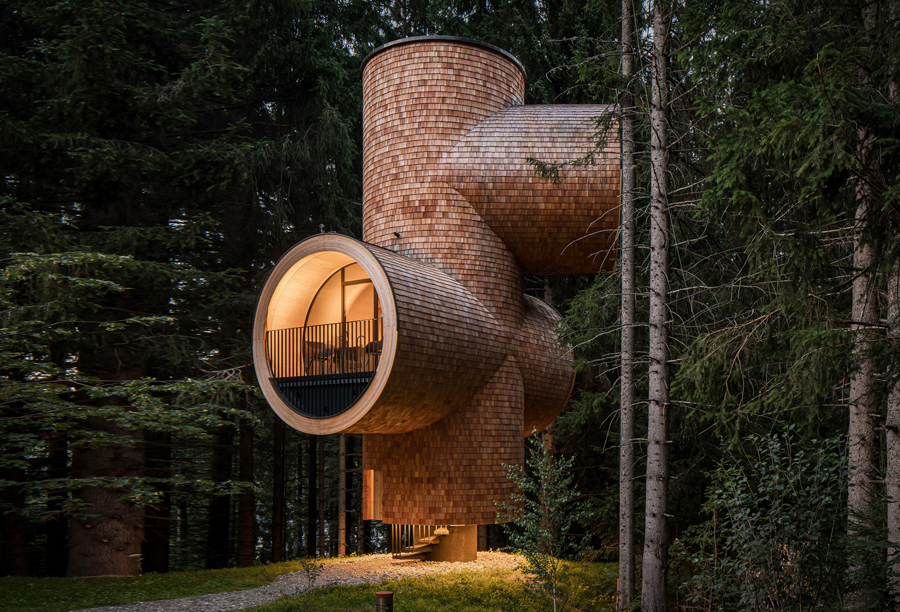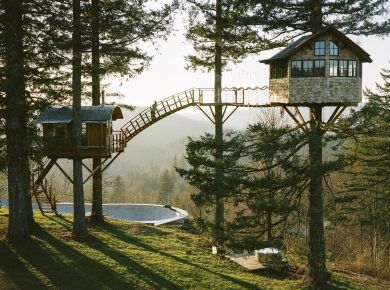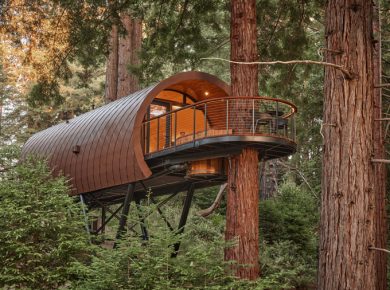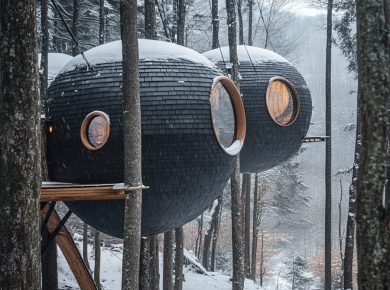
Tucked away in the scenic Austrian woodlands, four tubular structures emerge as if from the pages of a fairytale. Designed by architecture studio Precht in partnership with tiny-homes startup BaumBau, these whimsical abodes are the first installations of what is known as Bert – a modular treehouse concept with a minimal environmental footprint. Serving as accommodation for guests and staff at Steirereck am Pogusch restaurant in the rural village of Pogusch, these unique structures are a true testament to the blend of imagination and eco-friendly design.

Chris Precht, the co-founder of Precht, illuminated the origins of Bert during a recent Architecture Project Talk. Precht said they approached the project with the uninhibited creativity of a child, asking what an imaginative young mind would conceive. The goal was to design a building that harmonized a child’s dreamy vision with the very adult considerations of minimal environmental impact and structural stability.

Each of the Bert treehouses was constructed from prefabricated cross-laminated timber (CLT) components, crafted in a factory and then assembled on-site. These units are stacked on a circular concrete base, giving each treehouse a minimal footprint while providing a stable foundation. Assembly became increasingly efficient with each iteration, with the final Bert structure taking just one day to erect.

The modular system allows for a variety of configurations and elements, all preconceived in a catalogue developed in 2019. Such flexibility adds to the intrigue of the Bert structures, as they can adapt and expand based on needs and setting.

Clad in wooden shingles, these treehouses are further adorned with large, round windows, mimicking the eyes of beloved cartoon characters like Sesame Street’s Elmo or the Minions from Despicable Me. The interior stays true to the earthy, natural aesthetic, maintaining a darker atmosphere that contrasts the exterior wood. Furnishings also adhere to the tubular form, complete with black textiles and indirect lighting that appears almost ethereal.

While the Bert treehouses evoke a playful, fantastical atmosphere, they also aim to serve a deeper purpose. Chris Precht emphasized the transformative power of nature, especially for city dwellers who rarely escape urban confines. When surrounded by the millennia-old beauty of forests and mountains, individuals gain a new perspective on their place in the grander scheme of life.

The partnership between Precht and BaumBau is slated to last for a decade, focusing on creating structures that offer an alternative tourism experience. Targeting adventure-seekers and nature enthusiasts, these modular treehouses promise not just unique architecture but a journey into self-discovery and a greater appreciation for our natural world.


As more architects turn toward sustainable design, projects like Bert stand out for effortlessly blending environmental considerations with fantastical imagination. With similar proposals like Peter Pichler Architecture’s treehouses in the Dolomites, the field seems to be recognizing the importance of building in harmony with nature. By grounding designs in both environmental and imaginative landscapes, Bert offers a new way forward for the architecture of the future.










